What she had felt about it no one had ever known. All that could be said was that she had kept her side of the bargain admirably. She had been an efficient and loyal wife to Jeremy, a careful mother to his son, had forwarded Jeremy’s interests in every way and had never once suggested by word or deed that the match was anything but a freewill impulse on her part.
In response the Cloade family had an enormous respect and admiration for Frances. They were proud of her, they deferred to her judgment—but they never felt really quite intimate with her.
What Jeremy Cloade thought of his marriage nobody knew, because nobody ever did know what Jeremy Cloade thought or felt. ‘A dry stick’ was what people said about Jeremy. His reputation both as a man and a lawyer was very high. Cloade, Brunskill and Cloade never touched any questionable legal business. They were not supposed to be brilliant but were considered very sound. The firm prospered and the Jeremy Cloades lived in a handsome Georgian house just off the Market Place with a big old-fashioned walled garden behind it where the pear trees in spring showed a sea of white blossom.
It was to a room overlooking the garden at the back of the house that the husband and wife went when they rose from the dinner table. Edna, the fifteen-year-old, brought in coffee, breathing excitedly and adenoidally.
Frances poured a little coffee into the cup. It was strong and hot. She said to Edna, crisply and approvingly:
‘Excellent, Edna.’
Edna went crimson with pleasure and went out marvelling nevertheless at what some people liked. Coffee, in Edna’s opinion, ought to be a pale cream colour, ever so sweet, with lots of milk!
In the room overlooking the garden, the Cloades drank their coffee, black and without sugar. They had talked in a desultory way during dinner, of acquaintances met, of Lynn’s return, of the prospects of farming in the near future, but now, alone together, they were silent.
Frances leaned back in her chair, watching her husband. He was quite oblivious of her regard. His right hand stroked his upper lip. Although Jeremy Cloade did not know it himself the gesture was a characteristic one and coincided with inner perturbation. Frances had not observed it very often. Once when Antony, their son, had been seriously ill as a child; once when waiting for a jury to consider their verdict; at the outbreak of war, waiting to hear the irrevocable words over the wireless; on the eve of Antony’s departure after embarkation leave.
Frances thought a little while before she spoke. Their married life had been happy, but never intimate in so far as the spoken word went. She had respected Jeremy’s reserves and he hers. Even when the telegram had come announcing Antony’s death on active service, they had neither of them broken down.
He had opened it, then he had looked up at her. She had said, ‘Is it—?’
He had bowed his head, then crossed and put the telegram into her outstretched hand.
They had stood there quite silently for a while. Then Jeremy had said: ‘I wish I could help you, my dear.’ And she had answered, her voice steady, her tears unshed, conscious only of the terrible emptiness and aching: ‘It’s just as bad for you.’ He had patted her shoulder: ‘Yes,’ he said. ‘Yes…’ Then he had moved towards the door, walking a little awry, yet stiffly, suddenly an old man…saying as he did so, ‘There’s nothing to be said—nothing to be said…’
She had been grateful to him, passionately grateful, for understanding so well, and had been torn with pity for him, seeing him suddenly turn into an old man. With the loss of her boy, something had hardened in her—some ordinary common kindness had dried up. She was more efficient, more energetic than ever—people became sometimes a little afraid of her ruthless common sense…
Jeremy Cloade’s finger moved along his upper lip again—irresolutely, searching. And crisply, across the room, Frances spoke.
‘Is anything the matter, Jeremy?’
He started. His coffee cup almost slipped from his hand. He recovered himself, put it firmly down on the tray. Then he looked across at her.
‘What do you mean, Frances?’
‘I’m asking you if anything is the matter?’
‘What should be the matter?’
‘It would be foolish to guess. I would rather you told me.’
She spoke without emotion in a businesslike way.
He said unconvincingly:
‘There is nothing the matter—’
She did not answer. She merely waited inquiringly. His denial, it seemed, she put aside as negligible. He looked at her uncertainly.
And just for a moment the imperturbable mask of his grey face slipped, and she caught a glimpse of such turbulent agony that she almost exclaimed aloud. It was only for a moment but she didn’t doubt what she had seen.
She said quietly and unemotionally:
‘I think you had better tell me—’
He sighed—a deep unhappy sigh.
‘You will have to know, of course,’ he said, ‘sooner or later.’
And he added what was to her a very astonishing phrase.
‘I’m afraid you’ve made a bad bargain, Frances.’
She went right past an implication she did not understand to attack hard facts.
‘What is it,’ she said; ‘money?’
She did not know why she put money first. There had been no special signs of financial stringency other than were natural to the times. They were short-staffed at the office with more business than they could cope with, but that was the same everywhere and in the last month they had got back some of their people released from the Army. It might just as easily have been illness that he was concealing—his colour had been bad lately, and he had been overworked and overtired. But nevertheless Frances’ instinct went towards money, and it seemed she was right.
Her husband nodded.
‘I see.’ She was silent a moment, thinking. She herself did not really care about money at all—but she knew that Jeremy was quite incapable of realizing that. Money meant to him a four-square world—stability—obligations—a definite place and status in life.
Money to her was a toy tossed into one’s lap to play with. She had been born and bred in an atmosphere of financial instability. There had been wonderful times when the horses had done what was expected of them. There had been difficult times when the tradesmen wouldn’t give credit and Lord Edward had been forced to ignominious straits to avoid the bailiffs on the front-door step. Once they had lived on dry bread for a week and sent all the servants away. They had had the bailiffs in the house for three weeks once when Frances was a child. She had found the bum in question very agreeable to play with and full of stories of his own little girl.
If one had no money one simply scrounged, or went abroad, or lived on one’s friends and relations for a bit. Or somebody tided you over with a loan…
But looking across at her husband Frances realized that in the Cloade world you didn’t do that kind of thing. You didn’t beg or borrow or live on other people. (And conversely you didn’t expect them to beg or borrow or live off you!)
Frances felt terribly sorry for Jeremy and a little guilty about being so unperturbed herself. She took refuge in practicality.
‘Shall we have to sell up everything? Is the firm going smash?’
Jeremy Cloade winced, and she realized she had been too matter-of-fact.
‘My dear,’ she said gently, ‘do tell me. I can’t go on guessing.’
Cloade said stiffly, ‘We went through rather a bad crisis two years ago. Young Williams, you remember, absconded. We had some difficulty getting straight again. Then there were certain complications arising out of the position in the Far East after Singapore—’
Читать дальше










